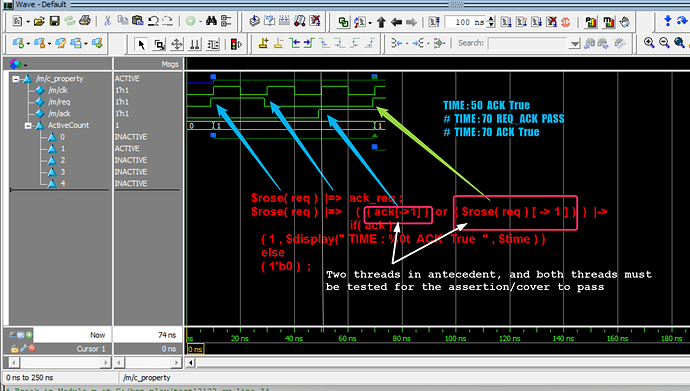In reply to ben@SystemVerilog.us:
Ben as you pointed that the difference between the two is visible when it’s used as antecedent .
Hence I tried the following ::
property req_ack ;
`ifdef GO_TO
@( posedge clk ) $rose( req ) [ ->1 ] |=> $rose( ack ) ; // [E1]
`else
@( posedge clk ) $rose( req ) [ = 1 ] |=> $rose( ack ) ; // [E2]
`endif
endproperty
c_property : cover property ( req_ack ) $display(" TIME : %0t PASS " , $time ) ;
a_property : assert property ( req_ack ) else $display(" TIME : %0t FAIL " , $time ) ;
initial forever #10 clk = ! clk ;
initial begin
// [1] ' req ' is True on 2nd posedge N then ' req ' is de - asserted just before Next posedge .
// ' ack ' is asserted at TIME : 49 !!
#20; // TIME:20
#9 ; req = 1 ; // TIME:29
#20 ; ack = 1 ; // TIME:49
#20 ; req = 0 ; // TIME:69
#5 ;
$finish() ;
end
The O/P for +define+GO_TO ::
TIME : 50 PASS
TIME : 50 PASS // [ Q1 ] Why the 2nd Pass at TIME : 50 ??
The O/P for No +define i.e Via Non - Consequent Repetition ::
TIME : 70 FAIL
TIME : 70 FAIL // [ Q2 ] Why the Two Failures ??
I am trying to understand when would the antecedent True in both Cases .
So as you suggested the antecedent is equivalent to ::
// For +define+GO_TO ::
$rose( req ) [ ->1 ] is equivalent to :: ( ! $rose( req )[*0:$] ) ##1 $rose( req )
i.e ( ! $rose( req )[*0] or ! $rose( req ) [*1] or ! $rose( req ) [*2] or .... ) ##1 $rose( req )
Due to assertion being Multi - threaded ::
(1) First Thread starts on 1st posedge of Clock at TIME : 10
At 1st posedge at TIME : 10 , $rose( req ) is False . Hence ! $rose( req ) [ *1 ] is True !!
At 2nd posedge at TIME : 30 , $rose( req ) is True .
Hence antecedent is True at TIME : 30 !!
At 3rd posedge at TIME : 50 , as $rose( ack ) is True it's a Match and
for Thread 1 the assertion Passes at TIME : 50 !!
(2) Second Thread starts on 2nd posedge of Clock at TIME : 30
For the 1st posedge for Thread 2 at TIME : 30 ( 2nd posedge for the Simulation ) ::
( ! $rose( req )[*0] ) is True at TIME : 30
**[ Q3 ] So how is the antecedent True at TIME : 30 for Thread 2 ? As ##1 $rose( req ) is still not True**
// For No +define i.e Via Non - Consequent Repetition ::
Antecedent ' $rose( req ) [ = 1 ] ' is equivalent to ::
( ! $rose( req )[*0:$] ) ##1 $rose( req ) ##1 ( ! $rose( req )[*0:$] )
i.e ( ! $rose( req )[*0] or ! $rose( req ) [*1] or ... ) ##1 $rose( req ) ##1 ( ! $rose( req )[*0] or ! $rose( req ) [*1] or ... )
i.e ( Empty or ! $rose( req ) [*1] or ... ) ##1 $rose( req ) ##1 ( ! $rose( req )[*0] or ! $rose( req ) [*1] or ... )
At 1st posedge at TIME : 10 , $rose( req ) is False . Hence ( ! $rose( req ) [ *1 ] ) is True !!
At 2nd posedge at TIME : 30 , $rose( req ) is True .
At 3rd posedge at TIME : 50 , $rose( req ) is False .
Hence ( ! $rose( req ) [ *1 ] ) is True !!
As a result I believe Antecedent is True at TIME : 50 ( Please correct me if wrong )
At TIME : 70 , $rose( ack ) is False hence the Failure ( Please correct me if wrong )
[ Q4 ] But why does Thread2 FAIL at TIME : 70 ? When would the antecedent be True for Thread 2 ??
